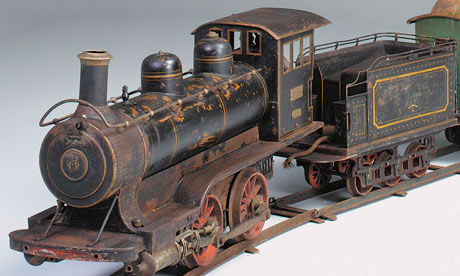Over the North Sea lies the richest country in Europe, its success built on the manufacturing industry that Britain has spurned

'The war hadn't been over 10 years and somehow Germany was making model trains more convincing than our own'
We all want to be Germans now: to make, to sell and not to yield. We would like to earn some respect, not least self-respect, and have some idea of our national future. The UK will never replace Germany as the world's second largest exporter, but we can surely manage to manufacture a few more things and "rebalance the economy", as the saying goes, to shrink the influence of the City of London.
So many people have had this dream recently – Vince Cable, of course, and Lord Glasman, no doubt, but also George Osborne when he made his fatuous speech about the "march of the makers". And there over the North Sea is the richest country in Europe: exemplary Germany, with its technical schools and apprenticeships, its respect for engineers, and its layer of family businesses known as the Mittelstand that puts long-term reputation above short-term profit by making the specialised parts that industry everywhere needs. How foolish we were to imagine that national prosperity could be spun from figures on a computer screen, out of thin air. How silly to despise the making of three-dimensional objects as a lowly process that had quit the west for the east. And how wise it would be (so the dream goes) to take a leaf from Germany's book and make manufacturing a much larger slice of the economy, therefore returning Britain to an earlier and possibly more solid version of itself.
That self is a long time ago. I remember watching Edgar Reitz's long and haunting film Heimat in the mid 1980s. Through the life of one family, the history of Germany in the 20th century was related in all its difficulty. At one point in the second world war, two characters find part of an aircraft or a bomb (I can't recall which) in a field. "Look," says one to the other as he handles the object, "such fine English workmanship." There was no irony, though it seemed hardly credible that British engineering could have been prized in Germany only 40 years before, given that at that Thatcher moment the typical British workshop was being sold abroad as scrap.
Germany's technical superiority was plain to see by the 1960s, but my own enlightenment came rather earlier, when I was eight or nine and the recipient of German gifts at Christmas. These came from two sources. In 1945, my family had befriended a prisoner-of-war and stayed in touch with him when he went home to Hamburg. We sent parcels of coffee beans, while a small box of marzipan or a bottle of eau-de-cologne came in the other direction. But as the years passed, the German presents grew more sophisticated. For me, a toy fire engine with a working water pump; for my parents, topographical books of black and white photographs printed on cream paper that felt like velvet. Perhaps these luxuries could also be found in Britain, but we had never seen them.
These were portents. The epiphany – not that I thought of it like that at the time – arrived when my older brother came home on leave from national service in Germany. He was the second source of gifts, and once, from his kitbag, produced two model railway coaches, gauge 00 to match my Hornby set but made by the German toymakers, Marklin. Their detail was superb. My tinplate Hornby carriages relied on painting to produce an effect of windows and door handles, but on their Marklin equivalents the windows really were transparent and the pattern of rivets below them stood out in relief. The war hadn't been over 10 years, and somehow Germany was making things as inconsequential as model trains that were more convincing than our own. Suddenly "Made in England" no longer suggested a singularly high quality, not that in 1954 it was easy in Britain to find goods made anywhere else.
Fear and envy of German manufacturing prowess began a long time before, as any economic history will tell you. Together with the US, Germany began to displace Britain as the world's foremost industrial nation well before the close of the 19th century. Books and newspaper articles sounded the alarm ("American furniture in England – a further indictment of the trade unions," read a Daily Mail headline in 1900), but did little to prevent Britain falling further behind in the new industries that became so important in the 20th century. Germany established a clear lead in chemicals, electrical engineering, optics and instrument-making. At the outbreak of war in 1914, the British government found that every magnet in the country came from Stuttgart, while German chemical works supplied all the khaki dye for British military uniforms.
To a large extent, British decline was inevitable: other nations had learned how to make things and export markets would naturally shrink. But the particular contrast with Germany was instructive when it came to scientific education and the social position of manufacturers and engineers. According to Peter Mathias's classic economic history, The First Industrial Nation, only a dozen students were reading for a degree in natural sciences at Cambridge in 1872. Germany, meanwhile, had 11 entire universities devoted to science and technology. Its educational system embraced the idea of manufacturing, while England's public schools and ancient universities held it at arm's length.
Finance became the acceptable business profession for gentlemen. In the words of another historian, Martin Wiener, finance "involved the extraction of wealth by associating with people of one's own class in fashionable surroundings, not by dealing with … the working and lower-middle classes". In this way, the City became part of the elite and "could call upon government much more effectively than could industry to favour and support its interests".
This is a familiar and by now hardly controversial diagnosis of the British malaise, and every so often a government or a politician promises a fundamental reform in political attitudes, praising the country's long tradition of scientific discovery and technical invention. A few television programmes endorse the same point; Sir James Dyson appears with his vacuum cleaner. But, beyond that, nothing much happens. Look around the frontbenches on both sides of the Commons. Who there dares upset the City? Who there ever made anything three-dimensional, or even had a parent who did? Which of them would risk the chamber pot of failed hopes being emptied over their heads by calling for a national industrial strategy?
It would be lovely to emulate the industrial success of the Germans, but so much history is very hard to undo. The one cheerful note (or perhaps more a vengeful one) is that Marklin, which made my memorable little carriages, is now owned by a private equity company based in London.

No comments:
Post a Comment